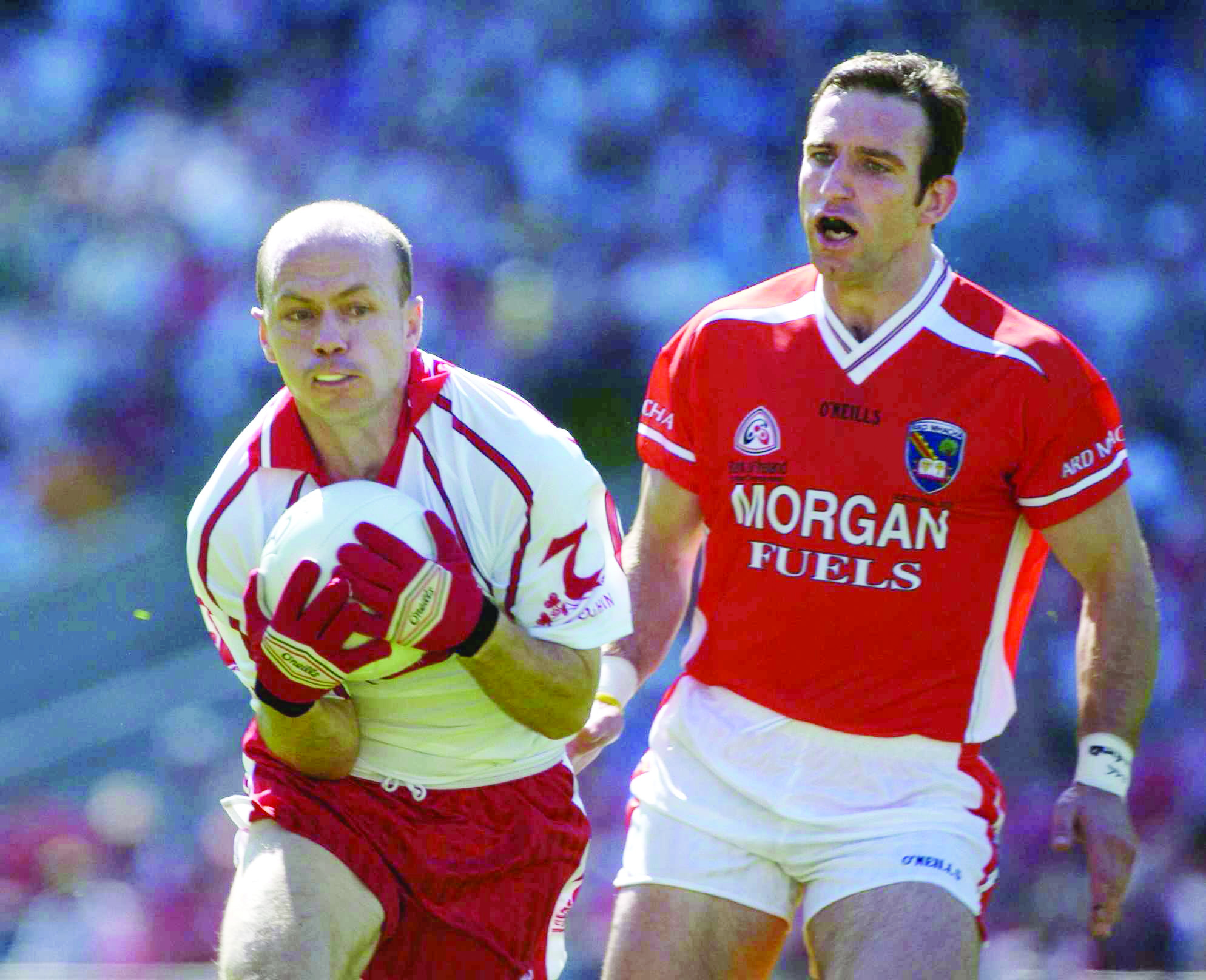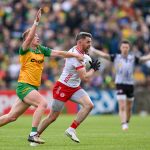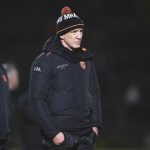Shaun Casey speaks to Gavin Devlin and Enda McNulty about Armagh and Tyrone’s famous trilogy of 2005.
GAELIC games are built on local rivalries. Keeping an eye on them ‘uns across the road. Matching, or more importantly, surpassing their success is what the sport thrives on. Back in 2005, Armagh and Tyrone shared a memorable trilogy of championship contests.
Not only were they the two dominant forces in Ulster, but the counties were very much the two front-runners for national honours as well. Armagh were crowned All-Ireland champions for the first time ever in 2002. Tyrone in 2003.
The 2004 season ended in disappointment for both. With an All-Ireland semi-final meeting almost guaranteed, the pair took their eyes off the ball. Armagh fell out of the championship at the hands of Fermanagh while Tyrone lost to Mayo on the very same day.
No such slip ups would occur in 2005. That year, Joe Kernan and Mickey Harte’s men were destined to do battle. That’s exactly how it panned out. Across those three box office encounters, only one point separated the two great enemies.
Having won the Division One league title for the very first time, Armagh were in flying form ahead of the championship. They’d go on to collect the Ulster title as well, but Tyrone had the last laugh, lifting Sam Maguire on the third Sunday in September.
“Back in the early 2000s, you had two counties at the peak of their powers. It was probably a bit unfortunate for both of us,” said Gavin Devlin, who picked up two All-Ireland medals in the red and white of Tyrone in 2003 and 2005.
“It was great at the time for the supporters and everything else but we were going up against each other and we actually dodged each other on a few occasions as well, whether that be in league finals or whatever,. We dodged each other in ’04 as well.”
Armagh defender Enda McNulty added: “I always enjoyed those games. They were always massive battles physically, mentally, tactically, technically. We knew Tyrone had brilliant players, they were very fit and they were very well-coached.
“They had great leaders on and off the pitch so we always had the utmost respect for them. You had to be on top of your game because a five per cent reduction in focus meant you were going to get caught very quickly.”
The Ulster final had been relocated to Croke Park in 2004 when the Orchard County hammered Donegal. Again in 2005, the provincial decider was played at Jones’ Road as Armagh and Tyrone locked horns.
Ten points from Stephen O’Neill seemed to have secured the title for the Red Hands, but Armagh battled back to steal a draw, with goals from Steven McDonnell and Oisín McConville along with a last-gasp Paul McGrane equaliser. Thirteen days later, it was back to HQ.
“2005 was a very unique year in terms of the two Ulster finals in Croker, it just shows you the magnitude of those games and the pull they had. There was a McKenna Cup game (2006) as well around that time that was packed,” added Devlin.
In the replay, the image of a deadly double substitution, with Peter Canavan and Owen Mulligan entering the fray, looked like the final nail in Armagh’s coffin but the madness was only beginning.
Sixty seconds after crossing the white line, Canavan was heading back to the dugout. A brawl ensued and the 2003 All-Ireland winning captain received his marching orders, alongside Armagh’s Ciaran McKeever, who picked up a second yellow card.
One of the exciting personal battles of those encounters was that of McNulty against Canavan. The Mullaghbawn defender was Kernan’s trusted lieutenant when it came to shutting down the Red Hand magician.
“It wasn’t a proper bust up, it was handbag stuff,” laughed McNulty of Canavan’s red card in the Ulster final replay. “It was like going from no fire in the forest to suddenly the whole forest in flames.”
McNulty relished the responsibility of stopping the best man on the opposition team. He was usually handed that duty, no matter who Armagh played, but picking up Canavan, and more importantly, stopping him, brought the best out in McNulty.
“I played with Peter several times with Ulster so that was a chance to learn. People would have said to me that it was a lot of pressure marking Peter but I always felt it was a total privilege. I knew I have to be one hundred per cent on my game.
“I’m unbelievably honoured that he never scored once from play in any of those (2005) games. I don’t say that in an arrogant way, I say that in a humble way because I put hundreds of hours into preparation for those games.
“I knew I was marking one the greatest players of that time. I used to go and watch him play in challenge games for Errigal Ciaran and sit in the back of my friend’s blacked out jeep so I’d get a sense of the runs he was making.”
Stephen O’Neill was also sent to the line for a second bookable offence, although strangely, he hadn’t been booked previously and Armagh emerged victorious to collect the Anglo Celt for the third time in four years, although they were the second best team on show.
“In both Ulster finals, I think we took good leads on both days,” recalled Devlin of how they let them slip. “Armagh were just that type of a team, they could grind you down and they were so physical and so strong, they played a certain template and they just persisted with it.
“They had serious quality along with that and they just wore you down. We were probably, in terms of the age bracket, a lot of our players were a wee bit younger than the Armagh players so Armagh would have been more physical I felt.
“As those games went on, it wasn’t by chance that they wore us down. I’d feel that, in the two Ulster finals, we could have possibly have shaded it in terms of being the better team over those two days.”
McNulty added: “In the Ulster final, I don’t know how we won that game, I don’t think we deserved it. We came back and scored a lot in the last four or five minutes but in the All-Ireland semi-final it was the other way around.”
The All-Ireland semi-final was the big one. Armagh had Ulster, but who could set up a decider date with Kerry? The game swung on tiny margins and big calls and in the end, the winning chance fell at the feet of Canavan, who duly obliged.
There was controversy as well. With the game nearing its finish, Kernan decided to remove Armagh skipper Kieran McGeeney from the battleground. With their talismanic leader off the pitch, Tyrone soared for home.
“It was a strange call that day with McGeeney going off,” Devlin continued. “He’d kicked a worldie and as everyone knows McGeeney was Armagh’s mainstay in terms of the leadership qualities and he organised everything throughout the field.
“Him going off that day, whatever the reason was, whether it was injury or whatever, I think it had a massive impact on the game. We seemed to get an energy off it. It was like scoring a two-pointer today.
“We just felt we could get to work now that McGeeney was away. I was in the subs looking down and I mind McGeeney standing along the sideline looking out and it was such a strange scene to be looking at, instead of him being stuck in the middle of it. When that happened, we definitely thought we had a chance.”
McNulty was the man replacing McGeeney. While it offered Tyrone a lifeline, the 2002 All-Star’s sole focus was on how he could impact the game.
“I’d have played in every one of those big games for Armagh,” McNulty, who made his championship debut against Tyrone in 1997, explained.
“Joe left me out of the semi-final, he put Ciaran McKeever in at corner-back and I was completely devastated. It was the first big game that I wasn’t starting for. I was brought on towards the end of that game.
“I’ll regret that for the rest of my days that I wasn’t in a better place mentally and emotionally because all I had to do was make one tackle that day to result in Armagh possibly winning.
“I was itching to get on and Geezer, no question about it, was one of our most important players, so I knew psychologically how that was going to impact the Tyrone players. At that stage my only thought was to get in and add value.
“I wasn’t so much feeling for Geezer, he wouldn’t have wanted me to think like that. I was thinking about getting in and helping the team. Afterwards we would have all reflected that we all could have done a better job in closing that game out.
“I wouldn’t apportion all the responsibility on Joe or Geezer or anyone. We collectively needed to look at ourselves in the mirror, I could have added a lot more in that period of time and all of us needed to take responsibility for not closing the game out.”
This weekend’s duel doesn’t have the same prize on the line, but the essential bragging rights that come with such a meeting are very much up for grabs. The rivalry enjoyed 20 years ago looks like it’s on the way back, but perhaps not yet.
“I’m not sure we’re quite there yet,” stated Devlin. “I’d like to think that in the next two or three years, we’ll definitely be at that level. I expect Armagh will still be at that level and I think we’re just slightly off where we’d like to be.
“It’s a massive jump to ask Malachy (O’Rourke) and Ryan (Porter) to catapult our team from where it was last year to compete with the very, very best in Ireland like Armagh. I do expect us to compete really well at the weekend.
“We could possibly even shade it but in terms of quality and our aspirations for the year and later on, down in Croke Park, I feel that Armagh are probably further down the road than what we are.
“Tyrone are definitely trending in the right direction from last year in terms of growth and improvement but whether we’re at the level where Armagh are at right now, I’m not just quite sure if we’ve made that just so quickly.”
Check out more of Enda’s work at www.mcnultyperformance.com
Check out this week’s podcast with Brendan Devenney and Steven McDonnell, looking ahead to this weekend’s Ulster SFC semi-finals.
Receive quality journalism wherever you are, on any device. Keep up to date from the comfort of your own home with a digital subscription.
Any time | Any place | Anywhere















